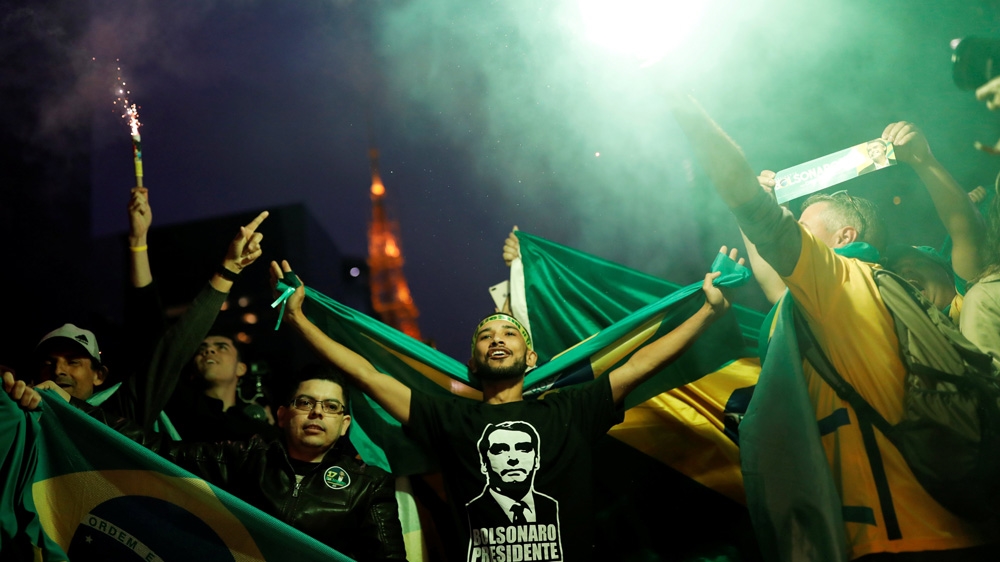Brazil elections: Far-right leader Jair Bolsonaro wins presidency
Sao Paulo, Brazil – Far-right candidate Jair Bolsonaro has won Brazil’s presidential elections, signalling a political shift for South America’s most populous nation and largest economy.
Official results gave Bolsonaro a 56 percent share of the vote in Sunday’s runoff, comfortably ahead of Fernando Haddad, the candidate of the centre-left Workers’ Party (PT), who had 44 percent.
Bolsonaro gave an internet address via Facebook Live, shunning a traditional press conference due to security concerns. In September, he suffered a near fatal stabbing at a campaign rally.
“We could no longer be flirting with socialism, communism, populism and extremism on the left,” he said.
Supporters wearing t-shirts emblazoned with Bolsonaro’s face and Brazil’s yellow and green national colours assembled outside his house in the Barra da Tijuca neighbourhood of Rio de Janeiro.
In Sao Paulo, supporters gathered on Avenida Paulista, the city’s main thoroughfare, with flags and banners that read Bolsonaro’s “Brazil above everything, God above everyone” slogan.
 |
| Bolsonaro supporters celebrate in Sao Paulo [Nacho Doce/Reuters] |
‘He’ll give us security’
PT had won the last four elections in Brazil, while its popular founder Luiz Inacio “Lula” da Silva was the frontrunner this year until being barred from running in September because of a corruption conviction.
Throughout the campaign, Bolsonaro promised to crack down on Brazil’s violent crime that saw nearly 64,000 homicides last year. He wants to increase gun ownership and has pledged to give police “carte blanche” to kill.
“He’ll give us the security that the country needs, behind this education and healthcare will follow,” said Maria Lucia de Almeida, 84, a retired Sao Paulo teacher.
“He’s honest.”
But for other voters, Bolsonaro is an authoritarian and a threat to democracy. He has a history of disparaging remarks against LGBT people, women and minorities and has spoken of his support for torture and extrajudicial police killings.
“He’s made it clear that he doesn’t want to sit and have dialogue with those that think different from him,” said Pedro Igor Mantoun, 29, a corporate lawyer from Sao Paulo who voted for Haddad.
“For any country, this is a bad thing but especially for one with such a young democracy as ours.”
Controversial past
Bolsonaro’s rise from a fringe congressman to the presidency has come against a backdrop of economic downturn, political turmoil, mammoth corruption scandals and rising violence.
Bolsonaro is an outspoken supporter of Brazil’s brutal and repressive 1964-1985 military dictatorship, a period when hundreds of political opponents were murdered by the state and thousands more tortured.
He is expected to stuff his cabinet with generals and ex-military men.
Last Sunday, during a confrontational speech transmitted to thousands of supporters, Bolsonaro said “red (leftist) criminals” would be “banished from our homeland” and pledged a “cleansing never seen before”.
“Brazil will not become a dictatorship, we won’t see congress closed,” said Mauricio Santoro, a political scientist and professor of international relations at Rio de Janeiro State University.
“But we know from experience in other countries that electing an extreme president brings bad consequences for democracy.”
Elsewhere, in the gubernatorial elections, in Sao Paulo, former mayor, media tycoon and once host of Brazil’s version of The Apprentice TV programme Joao Doria won the race against incumbent Marcio Franca.
In Rio de Janeiro, Bolsonaro ally and former judge Wilson Witzel beat Eduardo Paes who presided as mayor for two terms, included when the city hosted the 2016 Olympics.




